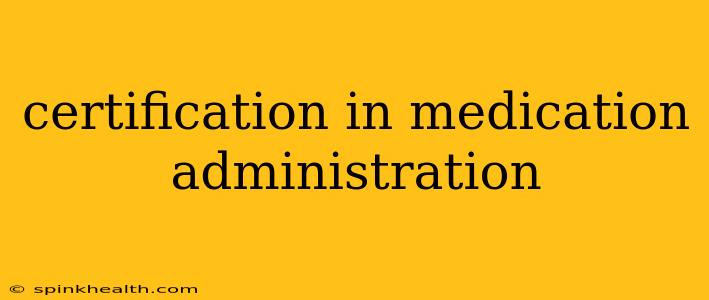The hushed quiet of a hospital room, the focused intensity of a clinic, the comforting presence of a caregiver – these are the scenes where certified medication administrators play a vital role. This isn't just about handing out pills; it's about ensuring patient safety, understanding complex drug interactions, and being a crucial link in the healthcare chain. Getting certified in medication administration is a significant step, one that opens doors to rewarding careers and enhances your professional credibility. But the journey, like the administration of medication itself, requires precision and understanding. Let's explore this path together.
What Does Medication Administration Certification Entail?
Medication administration certification validates your knowledge and skills in safely and accurately administering medications. This involves far more than simply knowing how to read a prescription. It encompasses a deep understanding of pharmacology, patient assessment, legal and ethical considerations, and the potential for adverse drug reactions. The specific requirements vary depending on the certifying body and the level of certification, but generally include:
- Rigorous coursework: This covers topics like medication calculations, drug classifications, routes of administration (oral, injection, topical, etc.), recognizing medication errors, and documenting medication administration accurately.
- Practical skills training: Hands-on practice is crucial, allowing you to develop proficiency in various administration techniques under the supervision of experienced professionals. This often involves simulated scenarios and real-life observations.
- Examinations: Successful completion of written and, in some cases, practical examinations demonstrates mastery of the required knowledge and skills.
What are the different types of medication administration certifications?
The specific certifications available depend largely on your location and the healthcare setting you're interested in. There's no single, universally recognized certification. However, you'll often find certifications tailored to specific roles, such as Certified Medication Aide (CMA), Certified Nursing Assistant (CNA) with medication administration endorsement, or those specific to long-term care facilities. Researching certifications relevant to your geographic location and career goals is essential.
How long does it take to get certified in medication administration?
The timeframe for obtaining medication administration certification varies significantly based on the program's intensity and your prior experience. Some accelerated programs might be completed in a few weeks or months, while others may take longer, especially if you're pursuing a broader healthcare certification that includes medication administration as one component.
What are the career options with medication administration certification?
Holding a medication administration certification opens doors to various healthcare roles, including:
- Certified Medication Aides (CMAs): Working in nursing homes, assisted living facilities, and other long-term care settings.
- Home health aides: Providing medication administration services to patients in their homes.
- Nursing assistants (CNAs) with medication administration skills: Contributing to a broader scope of care within hospitals, clinics, and other healthcare facilities.
What are the requirements for medication administration certification?
This depends entirely on the certifying body and specific program. Generally, though, expect requirements like a high school diploma or equivalent, a background check, and sometimes, previous healthcare experience.
What is the cost of medication administration certification?
Program costs are variable and depend on the length of the program, the location, and the provider. It's advisable to directly contact potential certification providers to inquire about their fee structure.
Where can I find medication administration certification programs?
Many community colleges, vocational schools, and healthcare training facilities offer medication administration certification programs. Online resources and your state's department of health can also provide valuable leads. Always verify accreditation to ensure the program meets accepted standards.
Your Journey Begins:
Obtaining certification in medication administration is a commitment to professional growth and a dedication to patient care. It's a path demanding precision, knowledge, and compassion. But the rewards—both personal and professional—are significant. By carefully researching programs, understanding the requirements, and dedicating yourself to learning, you can confidently embark on this journey and become a valuable asset to the healthcare community. Remember to always check with your local health authorities for the most current and relevant information for your area.

